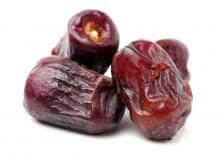Ask the Diva: Are Dates a Healthy Way to Sweeten Foods?
Should dates be considered fruit or added sugar? Nutrition Diva answers a reader question.
Monica Reinagel, MS, LD/N, CNS

Answer. Because dates are a fruit, products sweetened with dates and date puree can legitimately claim to have zero added sugars. But, frankly, dates are about as close as you can get to sugar and still call yourself a fruit. (For that matter, I guess sugar cane could technically be considered a whole grain!)
When we talk about limiting added sugar, we’re usually talking about refined sugar and other concentrated sweeteners like honey or maple syrup. (Yup, even though they’re natural, they’re still considered added sugars). The naturally-occurring sugars in whole fruit and dairy products are usually given an exemption.
But let’s take a look at the nutritional details. An ounce of medjool dates contains 19 grams of sugar and 2 grams of fiber. An ounce of honey provides 23 grams of sugar and 0 grams of fiber. Neither one is a significant source of vitamins or minerals. Aside from a gram or two of fiber, a bar or cookie sweetened with dates is really not that much different from a bar or cookie sweetened with honey.
Selecting foods sweetened with dates instead of refined sugar might offer a (very) slight nutritional advantage, but I’d still count those grams of sugar toward your added sugar allowance of about 25 grams per day.
See also: How to Reduce Your Added Sugar Intake
Medjool dates image courtesy of Shutterstock.

